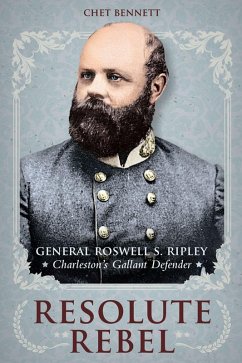The first biography of Gen. Ripley's complex, often contradictory military service in the U.S. and Confederate armies and his postwar British exploits
Roswell S. Ripley (1823-1887) was a man of considerable contradictions exemplified by his distinguished antebellum service in the U.S. Army, followed by a controversial career as a Confederate general. After the war he was active as an engineer/entrepreneur in Great Britain. Author Chet Bennett contends that these contradictions drew negative appraisals of Ripley from historiographers, and in Resolute Rebel Bennett strives to paint a more balanced picture of the man and his career.
Born in Ohio, Ripley graduated from the U.S. Military Academy and served with his classmate Ulysses S. Grant in the Mexican War, during which Ripley was cited for gallantry in combat. In 1849 he published The History of the Mexican War, the first book-length history of the conflict. While stationed at Fort Moultrie in Charleston, Ripley met his Charleston-born wife and began his conversion from unionism to secessionism. After resigning his U.S. Army commission in 1853, Ripley became a sales agent for firearms manufacturers. When South Carolina seceded from the Union, Ripley took a commission in the South Carolina Militia and was later commissioned a brigadier general in the Confederate army. Wounded at the Battle of Antietam in 1862, he carried a bullet in his neck until his death. Unreconciled in defeat, Ripley moved to London, where he unsuccessfully attempted to gain control of arms-manufacturing machinery made for the Confederacy, invented and secured British patents for cannons and artillery shells, and worked as a writer who served the Lost Cause.
After twenty-five years researching Ripley in the United States and Great Britain, Bennett asserts that there are possibly two reasons a biography of Ripley has not previously been written. First, it was difficult to research the twenty years he spent in England after the war. Second, Ripley was so denigrated by South Carolina's governor Francis Pickens and Gen. P. G. T. Beauregard that many writers may have assumed it was not worth the effort and expense. Bennett documents a great disconnect between those negative appraisals and the consummate, sincere military honors bestowed on Ripley by his subordinate officers and the people of Charleston after his death, even though he had been absent for more than twenty years.
Roswell S. Ripley (1823-1887) was a man of considerable contradictions exemplified by his distinguished antebellum service in the U.S. Army, followed by a controversial career as a Confederate general. After the war he was active as an engineer/entrepreneur in Great Britain. Author Chet Bennett contends that these contradictions drew negative appraisals of Ripley from historiographers, and in Resolute Rebel Bennett strives to paint a more balanced picture of the man and his career.
Born in Ohio, Ripley graduated from the U.S. Military Academy and served with his classmate Ulysses S. Grant in the Mexican War, during which Ripley was cited for gallantry in combat. In 1849 he published The History of the Mexican War, the first book-length history of the conflict. While stationed at Fort Moultrie in Charleston, Ripley met his Charleston-born wife and began his conversion from unionism to secessionism. After resigning his U.S. Army commission in 1853, Ripley became a sales agent for firearms manufacturers. When South Carolina seceded from the Union, Ripley took a commission in the South Carolina Militia and was later commissioned a brigadier general in the Confederate army. Wounded at the Battle of Antietam in 1862, he carried a bullet in his neck until his death. Unreconciled in defeat, Ripley moved to London, where he unsuccessfully attempted to gain control of arms-manufacturing machinery made for the Confederacy, invented and secured British patents for cannons and artillery shells, and worked as a writer who served the Lost Cause.
After twenty-five years researching Ripley in the United States and Great Britain, Bennett asserts that there are possibly two reasons a biography of Ripley has not previously been written. First, it was difficult to research the twenty years he spent in England after the war. Second, Ripley was so denigrated by South Carolina's governor Francis Pickens and Gen. P. G. T. Beauregard that many writers may have assumed it was not worth the effort and expense. Bennett documents a great disconnect between those negative appraisals and the consummate, sincere military honors bestowed on Ripley by his subordinate officers and the people of Charleston after his death, even though he had been absent for more than twenty years.
Dieser Download kann aus rechtlichen Gründen nur mit Rechnungsadresse in A, D ausgeliefert werden.


